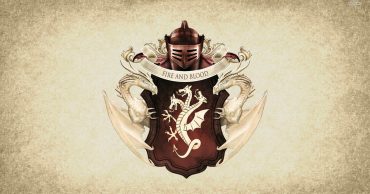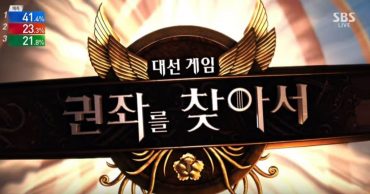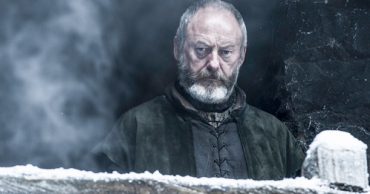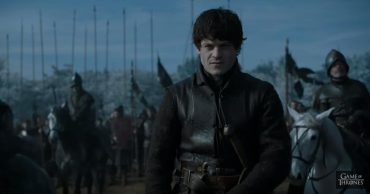
With Bran’s visions, Dany’s power check, and Tommen’s lessons from the High Sparrow, “Oathbreaker” is an hour of learning for the many character of Game of Thrones, an episode steeped in the history, both known and unknown, of the world of Westeros. In the process, it accomplishes two important things in rather elegant fashion, returning the show to some of its core examinations of faith and tradition of earlier seasons with some wonderfully rich material, and consolidating its world even further than the first two episodes did, bringing characters like Osha and Rickon back into the fold, while saying farewell to the would-be usurpers of the Night’s Watch.
Naturally, the episode begins where last week’s ended, where Jon Snow has some awful news for the many faithful of Westeros, revealing that after he died, he experienced a whole lot of nothing wherever he went. A quiet, powerful scene reveling in the silence between Davos and Jon, the opening images of “Oathbreaker” establish the core philosophy of the episode: everything is to be questioned in this new world we’re living in. When someone comes back from the dead (and not in the creepy, Iceman of the Dead resurrection sort of way), the natural order of the world falls askewer, and that titled perspective frames a lot of what is to come, in subtle, effective ways. Jon isn’t supposed to be alive: the rules of the world dictate that once a man is dead, he is dead – but at this point, Jon’s not even the only dead man walking around the world of Westeros (hey, Gregor – looking terrifying!), which means everything’s up for debate when it comes to tradition and logic on Game of Thrones.
That includes the history of Westeros: in the biggest tease of the series, Bran and the Man Who Became One With Tree watch Howland Reed, young Ned Stark, and crew take on Arthur Dayne and partner outside the Tower of Joy, where Ned’s sister Lyanne was being held captive – and presumably murdered, if we’re to believe the tales of history. Of course, as Bran learns, the dry ink of time and the fluid penmanship of oral history are quite different: turns out Ned didn’t win that battle, and was only able to make the promise to his dying his sister (whatever that promise was) was because one of his buddies stabbed Arthur in the back, denying Ned and Arthur the supposed “honorable”, natural end to their battle. A small detail, yes, but the ripples of these discrepancies found in supposed truths spread throughout this hour, and make for some intriguing stories for the future to explore.
Thematically, Dany’s conversation with the High Priestess of the Dothraki widow’s home explores this same idea: the elderly woman once dreamed of glorious destiny like Dany, only to find out her own story would turn out to be very different. Like anyone with a dream, reality often turns out different: even on a simpler level, Dany might call herself the Queen of Meereen, but is she really their savior and leader? Dany’s reality check in the widow hut isn’t exactly the most dramatically engaging or satisfying scene: however, it’s importance in continuing this thread of challenging traditions becomes stronger every time the camera cuts back to Dany’s determined face. After all, she is the Unburnt: nothing has stopped her before, so some old woman lighting big ass candles telling her to check herself isn’t exactly the most disheartening image. But as the old woman and Jon both know, sometimes we can experience every step and decision of our path to glory exactly as we dreamed it; even then, however, what we believe to be our destiny may not be what we once thought.
There are moments where these themes seep to the background for plot-related scenes like Varys’s wonderfully slimy discussion with the traitor Valla (and Osha and Rickon ending up in the “care” of Ramsay Bolton – but what can we say about that except “Oh, f***”), but for the most part, “Oathbreaker” is fixated on this exploration of tradition and legacy, and how often reality and humanity break the long-held ideals of the world (even with Gilly and Samwell; don’t you put Gilly in a farmhouse!). Cersei has it in abundance, with her son bucking to the high-minded rhetoric of the High Sparrow – but like her brother, Cersei’s ready for a little revisionist history of her own, ready to make the rules up as she goes along, whether it’s through the powers of the Mother or her own badass stare down face. And as Varys’ birds become the fluttering objects of someone else (there we again, breaking tradition), Game of Thrones feels like its returning to its root, exploring the dynamic relationship between truth, faith, and honor, and whether any of those ideas really exist at all in the mud-and-viscera caked landscapes of Westeros.
While it’s not a particularly momentous hour full of memorable images and iconic scenes, what “Oathbreaker” is building towards is something exciting for Game of Thrones. Long lost characters are being pulled out of the woodwork, while tired characters are being removed for the picture (adios, Alliser, you cranky motherf**ker), giving Game of Thrones some much-needed breathing room for the episode to explore the various oathbreakers of its world, from the reluctant detractors (Ned and Jon), to the most arrogant, brazenly defiant against history (just about everyone). This consolidation pays off in a number of ways throughout “Oathbreaker” – but perhaps the most promising sign of all is how this hour carefully weaves its themes together through all of its stories, creating one of the most unified, enjoyable journeys around the world of Westeros we’ve had in some time.
Other thoughts/observations:
- Arya… isn’t blind anymore? What the …. what??!
- Davos is the only person in Westeros who can make “Go fail again” sound like a supportive statement.
- Boy, Grey Worm, you really know how to carry a casual conversation…. it’s always “patrol, patrol, patrol” with this guy, amirite?
- Tyrion, you are certainly a wise man, even if history hasn’t given you credit for it yet.
- RIP Shaggydog :(
- “There’s always a third option” is a fantastic, if somewhat subdued, tagline for Game of Thrones.
- Throughout the season, I’ll be discussing Game of Thrones on the weekly TV Roundtable podcast, which you can find here.
- “I fought. I lost. Now I rest.”
 Follow Us
Follow Us






Visitor Rating: 5 Stars
Visitor Rating: 5 Stars